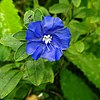
Cuscuta (dodder) is a genus of over 201 species of yellow, orange, or red parasitic plants also known as Amar bail in India. Formerly treated as the only genus in the family Cuscutaceae, it now is accepted as belonging in the morning glory family, Convolvulaceae, on the basis of the work of the Angiosperm Phylogeny Group. The genus is found throughout the temperate and tropical regions of the world, with the greatest species diversity in subtropical and tropical regions; the genus becomes rare in cool temperate climates, with only four species native to northern Europe.

Convolvulaceae, known commonly as the bindweed or morning glory family, is a family of about 60 genera and more than 1,650 species of mostly herbaceous vines, but also trees, shrubs and herbs, and also including the sweet potato and a few other food tubers.
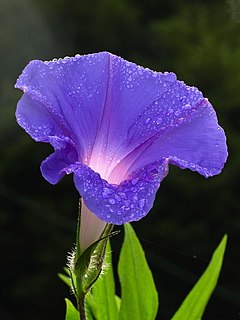
Morning glory is the common name for over 1,000 species of flowering plants in the family Convolvulaceae, whose current taxonomy and systematics are in flux. Morning glory species belong to many genera, some of which are:

Convolvulus is a genus of about 200 to 250 species of flowering plants in the bindweed family Convolvulaceae, with a cosmopolitan distribution. Common names include bindweed and morning glory; both names shared with other closely related genera.

Ipomoea is the largest genus in the flowering plant family Convolvulaceae, with over 600 species. It is a large and diverse group, with common names including morning glory, water convolvulus or kangkung, sweet potato, bindweed, moonflower, etc.

Calystegia is a genus of about 25 species of flowering plants in the bindweed family Convolvulaceae. The genus has a cosmopolitan distribution in temperate and subtropical regions, but with half of the species endemic to California. They are annual or herbaceous perennial twining vines growing 1–5 m tall, with spirally arranged leaves. The flowers are trumpet-shaped, 3–10 cm diameter, white or pink, with a sometimes inflated basal epicalyx.

Ipomoea pes-caprae, also known as bayhops, bay-hops, beach morning glory or goat's foot, is a common pantropical creeping vine belonging to the family Convolvulaceae. It grows on the upper parts of beaches and endures salted air. It is one of the most common and most widely distributed salt tolerant plants and provides one of the best known examples of oceanic dispersal. Its seeds float and are unaffected by salt water.

Ipomoea cairica is a vining, herbaceous, perennial plant with palmate leaves and large, showy white to lavender flowers. A species of morning glory, it has many common names, including mile-a-minute vine, Messina creeper, Cairo morning glory, coast morning glory and railroad creeper.
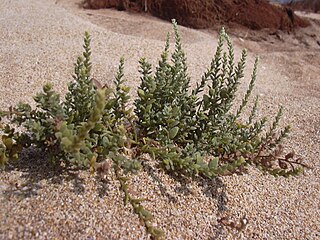
Cressa is a genus of plants in the morning glory family known generally as alkaliweeds. These plants are native to the tropical and subtropical areas of the world. They are clumpy and low-growing but usually have erect stems covered white-haired, green leaves. They produce tiny white flowers about half a centimeter across.
Acmispon prostratus, synonyms Lotus nuttallianus and Syrmatium prostratum, is a species of legume native to California and northwestern Mexico. It is known by the common names beach lotus, Nuttall's lotus, and wire bird's-foot trefoil. It is native to Baja California and just into San Diego County, California, where it is a resident of coastal habitats, such as beaches and bluffs.
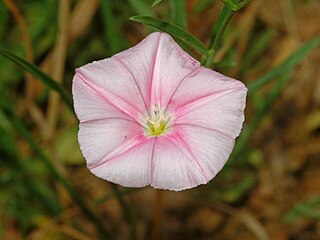
Convolvulus cantabrica, common name Cantabrican morning glory or dwarf morning glory, is a herbaceous perennial plant belonging to the genus Convolvulus of the family Convolvulaceae.

Evolvulus alsinoides, commonly known as dwarf morning-glory and slender dwarf morning-glory, is flowering plant from the family Convolvulaceae. It has a natural pantropical distribution encompassing tropical and warm-temperate regions of Australasia, Indomalaya, Polynesia, Sub-Saharan Africa and the Americas.
Dwarf morning-glory is a common name for several plants and may refer to:

Evolvulus nuttallianus is a species of flowering plant in the morning-glory family known by the common name shaggy dwarf morning-glory. It is found in the central United States.
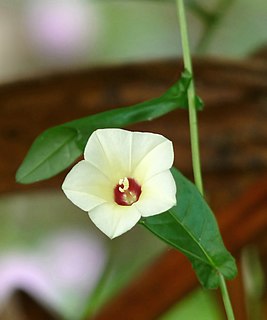
Xenostegia, the morningvines, are a genus of flowering plants in the bindweed and morning glory family Convolvulaceae, found across the Old World Tropics and Subtropics, from Africa, Madagascar, the Indian Subcontinent, southern Asia and Australia.

Evolvulus glomeratus, commonly known as blue daze, Brazilian dwarf morning-glory, or Hawaiian blue eyes, is flowering plant from the family Convolvulaceae that is native to Brazil, Guyana, Bolivia and Venezuela.



